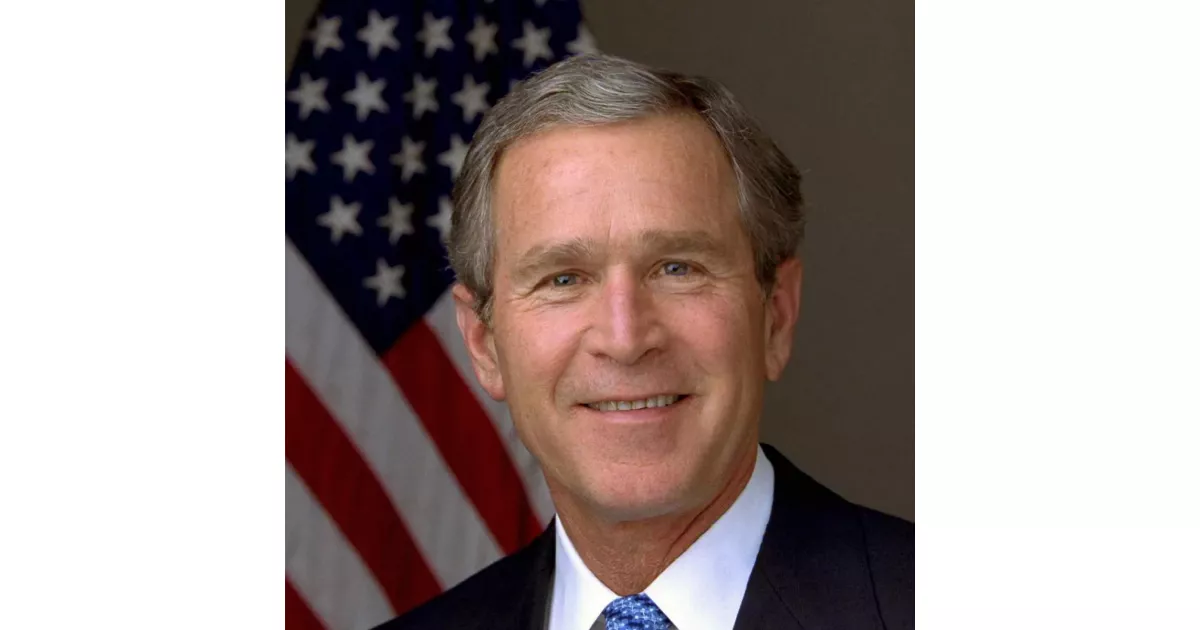A detailed timeline of the impact and legacy of George W. Bush across different fields.
George W. Bush, the 43rd U.S. President (2001-2009), is a Republican politician, businessman, and former U.S. Air Force officer. The son of President George H.W. Bush, he previously served as the 46th Governor of Texas (1995-2000). His presidency was largely defined by the September 11th terrorist attacks in 2001, which led to the launch of the War on Terror, including military interventions in Afghanistan and Iraq. Domestically, he enacted education reform legislation known as No Child Left Behind and signed tax cuts into law. His administration also faced criticism for its handling of Hurricane Katrina and the 2008 financial crisis.
September 4, 1976: Arrested for Driving Under the Influence
On September 4, 1976, George W. Bush was arrested for driving under the influence of alcohol in Kennebunkport, Maine.
1986: Gave Up Alcohol
In 1986, George W. Bush attributes his decision to give up alcohol to the influence of his wife, Laura.
January 2003: State of the Union address: PEPFAR outlined
In January 2003, George W. Bush announced a five-year strategy for global emergency AIDS relief, known as the President's Emergency Plan for AIDS Relief (PEPFAR), during the State of the Union address. Bush pledged $15 billion for the initiative.
2004: Strong support from military in election
In 2004, 73 percent of U.S. military personnel indicated they would vote for George W. Bush, while 18 percent preferred John Kerry. Peter Feaver suggested military members supported Bush due to his commitment to completing the War in Iraq.
December 2005: Bush's highest approval rating since December 2005
In December 2005, George W. Bush had achieved his highest approval rating since then, according to polls conducted in April 2013
2006: Creation of Papahānaumokuākea Marine National Monument
In 2006, President Bush declared the Northwestern Hawaiian Islands a national monument, creating the largest marine reserve to date. The Papahānaumokuākea Marine National Monument comprises 84 million acres and is home to 7,000 species of fish, birds, and other marine animals.
June 2007: Street in Tirana, Albania, renamed after Bush
In June 2007, a street in Tirana, Albania, was renamed after George W. Bush a few days before his visit, marking the first visit by an American president to Albania.
2008: Criticism of Bush's handling of the 2008 financial crisis
Critics often point to George W. Bush's handling of the 2008 financial crisis as proof that he was unfit to be president.
2008: Financial Crisis and Low Approval Ratings
In 2008, the U.S. entered the Great Recession, contributing to George W. Bush leaving office as one of the most unpopular U.S. presidents.
January 2009: Bush's favorability rating stands at 40 percent
In January 2009, George W. Bush's favorability rating in public opinion surveys stood at 40 percent.
March 2009: Bush's favorability rating decreases to 35 percent
In March 2009, George W. Bush's favorability rating decreased to 35 percent.
2009: C-SPAN's 2009 survey of historians ranked Bush as the 36th-best president
In 2009 C-SPAN's survey of historians ranked George W. Bush as the 36th-best president.
July 2010: Bush's favorability rating rises to 45 percent
In July 2010, George W. Bush's favorability rating rose to 45 percent.
September 19, 2010: Offer to Accept Palestinian Refugees
On September 19, 2010, former Israeli Prime Minister Ehud Olmert said that President Bush offered to accept 100,000 Palestinian refugees as American citizens if a permanent settlement had been reached between Israel and the Palestinian Authority.
November 9, 2010: Release of "Decision Points"
On November 9, 2010, George W. Bush released his memoirs, titled "Decision Points." During a pre-release appearance, Bush identified keeping the country safe as his biggest accomplishment and failing to secure Social Security reform as his greatest failure. He also defended his administration's enhanced interrogation techniques, including the waterboarding of Khalid Sheikh Mohammed.
2010: Siena Research Institute survey ranks Bush 39th out of 43 presidents
In 2010, a Siena Research Institute survey of historians, political scientists, and presidential scholars ranked George W. Bush 39th out of 43 presidents, giving him low ratings on various aspects of his presidency.
May 2011: Osama bin Laden Killed by U.S. Forces
In May 2011, two years after George W. Bush left office, Osama bin Laden was killed by U.S. forces under the Obama administration.
February 2012: Gallup reports Americans still rate Bush among the worst presidents
In February 2012, Gallup reported that Americans still rated George W. Bush among the worst presidents, although their views had become more positive since he left office.
2012: Bush receives Order of the Cross of Terra Mariana
In 2012, Estonian president Toomas Hendrik Ilves awarded George W. Bush the Order of the Cross of Terra Mariana for his work in expanding NATO.
April 2013: Bush's approval rating reaches 47 percent
In April 2013, George W. Bush's approval rating stood at 47 percent approval and 50 percent disapproval in a poll jointly conducted for The Washington Post and ABC, his highest approval rating since December 2005.
June 2013: Bush's ratings become more positive than negative
In June 2013, George W. Bush's ratings became more positive than negative for the first time recorded by Gallup, with 49 percent viewing him favorably compared to 46 percent unfavorably.
2013: PEPFAR saves five million lives
By 2013, The U.S. government had spent $44 billion on PEPFAR, and it was estimated that the initiative had saved five million lives since 2003. Peter Baker of The New York Times noted that "Bush did more to stop AIDS and more to help Africa than any president before or since."
2013: Bush comments on how history will judge his decisions
In 2013, George W. Bush stated that history will ultimately judge the decisions he made during his presidency and that he is comfortable with that.
2015: CNN poll finds an increase of nine points in favorability of Bush
A 2018 CNN poll showed that favorability of George W. Bush had increased nine points from 2015.
2017: Bush's public image improves, with 51 percent favorability from Democrats
In 2017, George W. Bush's public image saw greater improvement, with a YouGov survey showing 51 percent of favorability from Democrats.
2018: CNN poll finds 61 percent of respondents hold a favorable view of Bush
In 2018, a CNN poll found that 61 percent of respondents held a favorable view of George W. Bush, an increase of nine points from 2015.
September 11, 2021: Speech at Flight 93 National Memorial
On September 11, 2021, the 20th anniversary of the September 11 attacks, George W. Bush gave a speech at the Flight 93 National Memorial, praising the heroism of the people on Flight 93 and the spirit of America.
2021: C-SPAN's 2021 survey of historians ranked Bush as the 29th-best president
In 2021 C-SPAN's survey of historians ranked George W. Bush as the 29th-best president, improving from 36th in 2009.
2023: PEPFAR estimated to have saved over 25 million lives
By 2023, PEPFAR was estimated to have saved over 25 million lives, alleviating the severity of the HIV/AIDS epidemic especially in Sub-Saharan Africa, and was called "George W. Bush's greatest accomplishment" by Vox.
Mentioned in this timeline

Donald John Trump is an American politician media personality and...

Michelle Obama an American attorney and author served as the...

Barack Obama the th U S President - was the...

Bill Clinton the nd U S President - served as...
Ukraine is a country in Eastern Europe the second-largest on...

Joe Biden is an American politician who served as the...
Trending

3 months ago Michelle Obama: America 'not ready' for a woman president, cites sexism concerns.

1 hour ago Apple MacBook Pro: Touchscreen, Dynamic Island, and New Interface Coming Soon.

14 minutes ago Ethereum Price Faces Resistance at $1,950 Amidst Market Repricing Concerns.
15 minutes ago BP Receives Hold Ratings Amid Strategy Updates and Increased Rating by Argus.
1 hour ago Whitefox & Fluid Quip collaborate; Low-carbon ethanol boosted; Indoor plants aid climate resilience.
1 hour ago HSBC: Enterprise Software Strong, AI Enhances Capabilities, Valuations Historically Low.
Popular

Jesse Jackson is an American civil rights activist politician and...

Susan Rice is an American diplomat and public official prominent...

Barack Obama the th U S President - was the...

Michael Joseph Jackson the King of Pop was a highly...

XXXTentacion born Jahseh Dwayne Ricardo Onfroy was a controversial yet...

Bernie Sanders is a prominent American politician currently serving as...

